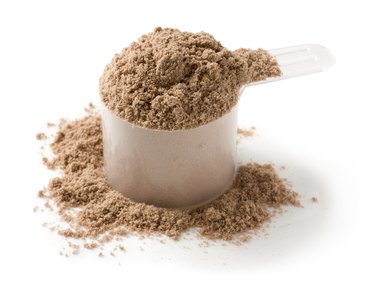
Protein is an important part of a balanced diet, providing the building blocks for body tissues. Protein powder, such as whey powder, can be added to your diet to supplement protein you consume from the foods you eat. According to a study published in 2013 by "ISRN Nutrition," eating too much protein can have long-term health effects, including the development of kidney stones and liver damage. If you already have liver or kidney damage, adding whey protein may cause more stress to these organs. Always consult your physician prior to supplementing with protein.
Too Much Protein
Video of the Day
You should try to get 12 to 20 percent of your daily total calories from protein, according to Kaiser Permanente. Generally, consuming regular amounts of protein on a daily basis will not increase your risk of kidney stones unless you have a preexisting condition. Once you begin ingesting more protein than your body can handle, it can become a problem. According to Harvard Health Publishing, the Recommended Daily Allowance for protein is calculated by multiplying your body weight in pounds, by 0.36. However, active people may need higher levels of protein intake to maintain muscle mass. For specific protein intake recommendations, talk to your healthcare provider.
Video of the Day
About Kidney Stones
According to the National Institute of Diabetes Digestive and Kidney Diseases, or NIDDK, kidney stones occur when components of urine — calcium, oxalate, uric acid and phosphorus — rise and get out of balance. When the levels of these components become too concentrated, they can harden and form tiny stones or mineral deposits. These stones can block the flow of liquids and cause damage or infection. When you consume too much protein, your kidneys can get overworked and become less effective at flushing and diluting byproducts from the breakdown of protein, which can lead to whey protein kidney stones.
Who Is at Risk
If you are already susceptible to developing kidney stones, adding extra protein in the form of whey may increase your risk of kidney stones. According to the NIDDK, risks of developing kidney stones include having a family history of kidney stones, repeated urinary tract infections, not drinking enough fluids and obesity. If you already have them, natural remedies for kidney stones include avoiding extra protein or other foods that cause kidney stones.
Kidney Stone Prevention
High-protein diets can increase your risk of kidney stones, and even more so when you don't eat enough fiber or drink enough water. Both water and fiber help with the digestion and breakdown of protein. Not drinking enough water makes it harder for your kidneys to flush out toxins and other protein byproducts. According to the National Institute of Diabetes and Digestive and Kidney Diseases, you should aim to drink between six and eight, 8-ounce glasses of water each day, if you don't have kidney disease. Fiber can help your stomach digest protein, and it keeps your stools from becoming too hard. Hard stools can lead to hemorrhoids and anal fissures. According to the American Heart Association, adults should aim for 25 to 30 grams of fiber from foods on a daily basis.
- National Institute of Diabetes and Digestive and Kidney Diseases: What I Need to Know About Kidney Stones
- National Institute of Diabetes and Digestive and Kidney Diseases: Kidney Stones in Adults
- Centers for Disease Control and Prevention: The Dietary Guidelines for Americans 2015-2020
- ISRN Nutrition: Adverse Effects Associated with Protein Intake above the Recommended Dietary Allowance for Adults
- American Health Association: How Do I Follow a Healthy Diet?
- Kaiser Permanente: Balancing Carbs, Protein, and Fat
- National Institute of Diabetes and Digestive and Kidney Diseases: Eating, Diet & Nutrition for Kidney Stones
- Harvard Health Publishing: How Much Protein Do You Need Every Day?
Is this an emergency? If you are experiencing serious medical symptoms, please see the National Library of Medicine’s list of signs you need emergency medical attention or call 911.